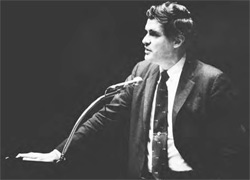The Passing of an Education Giant
Sizer was also a former head of TC’s President’s Advisory Council and a past recipient – together with his wife, the educator Nancy Sizer -- of the Klingenstein Leadership Award from TC’s Klingenstein Center for Independent School Leadership.
“Ted was involved in the creation of the Klingenstein Center,” recalled the Center’s director, TC Professor Pearl Kane. “Most of all he was a great mentor and role model for me, someone who always listened and learned from people with view points.
In 2004, when the Center honored the Sizers, Kane wrote – in remarks that, because she was ill, were delivered by a colleague:
“Educators, authors, visionaries and models of successful partnership, Nancy and Ted Sizer have influenced the independent school world for over 40 years, whoing us new ways of thinking about education and about ourselves. As a team, they have sought with passion and determination to bring common sense to the American schoolhouse: Developing outreach programs for minorities and disadvantaged youth; calling for teacher appreciation and recognition of the Horace Smiths of the world; inspiring moral education in schools; questioning the function of the senior year; enhancing relationships between Their influence has been felt through many initiatives,
Sizer’s own account of his career appears in Those Who Dared: Five Visionaries Who
Changed American Education, published by Teachers College Press in 2008.
“Ted Sizer was one of the giants of American education,” New York University
education historian Diane Ravitch said. “He cared more about the quality of
learning than test scores.”
Sizer wrote Horace's Compromise
(1984), a book based on his five-year study of 80 high schools around the
country. The book is, told through the eyes of Horace Smith, a fictional
middle-aged teacher in a suburban high school. It was the first in a trilogy,
followed by Horace's School: Redesigning
the American High School (1992) and Horace's
Hope: What Works for the American High School (1996).
Sizer, said Harvard University education professor Howard Gardner, “stands out
among American educators of the last half-century” as “a brilliant leader of
educational institutions . . . the creator of original and important ideas
about schools; and a powerful, evocative and influential writer.”
Sizer articulated nine principles for school reform, including “learning to use
one’s mind well” as the primary purpose of school. He believed in class loads
of no more than 80 students per high school teacher and 20 at the elementary
level, and called for the replacement of conventional tests with “exhibitions”
in which students demonstrate their knowledge of a subject.
Sizer was a Yale graduate who suffered from dyslexia and described himself as a
mediocre. He served in the Army and then earned a master's degree in teaching
at Harvard in 1957 and a doctorate in education and history in 1961. He became
dean of Harvard's graduate school of education in 1964.
Published Tuesday, Oct. 27, 2009
